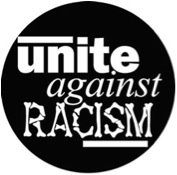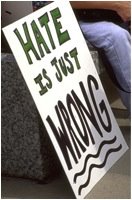Race and Modern Society: How equal are we?

An editorial by Jacob Unson
In the years since the relative success of the historic American Civil Rights Movement of the late 20th century, we have --or at least claim to have—made great strides in racial equality. Gone are the days of segregated schooling, separate facilities for whites and blacks, and our armed forces are made up of a diverse mix of people from different ethnicities. In the same vein that America is considered a “melting pot” for all sorts of people and cultures, ethnic, religious, and racial diversity is part of what it truly means to be “American.” Yet something still bothers me. Speaking as a Filipino expatriate, I still get the feeling that somewhere, on a certain level, we are still divided and separated, and I feel the basis for it is race. The evidence can be subtle and not easily noticeable, but the proof is there. We go about our daily lives, mostly unaware of the ways in which we are not truly equal. For most Americans, there still exists a level of prejudice and racism that we are less than willing to admit.
Let us start with one of the most talked-about groups in America today. Hispanics and Latinos are quickly becoming a major part of our country’s population. Yet they are often portrayed --especially by the conservative media-- as scoundrels, criminals, and ne’er do-ells whose intent seems to be to undermine our country. In truth, many of them just want to seek a better life than what they can find in their home countries in order to support their families back home. Lack of jobs, industry, poor conditions, and barely enough pay just to get by are all root causes for these people to try to get on American soil, where the pay is sufficient enough for them to support their families. True, undocumented immigration is prohibited by law, but these immigrants are by no means evil. However, all we usually hear about are the bad seeds that occasionally pop into the country rather than the hardworking people who are trying to support their families. This limited point of view only reinforces negative stereotypes that anyone who fits a certain profile and speaks Spanish as their mother tongue is automatically an illegal immigrant, and should not be trusted or treated with respect.
This is the wrong attitude to take, and we cannot forget that there are hundreds, if not thousands of communities of upstanding, hard-working Latino-Americans whose allegiance is to the United States of America; not to Mexico, not to Guatemala, El Salvador, or any Central or South American nation that may or may not hate the United States’ guts. We have students in our school who share a similar heritage, hailing from countries like those mentioned above. Sure, they speak a language that we have a class specifically dedicated to learning. Sure, they have different customs than we do. Let us not regard them with ignorance and masked hatred. Instead, we must make an effort to help them feel welcome and at ease. Be friendly to these students whose ambition is similar to that of their non-Hispanic peers: to get a good education so that they are prepare
 d for the professional world and perhaps make a difference in the community.
d for the professional world and perhaps make a difference in the community.Moving on, we have Arab-Americans in our society. Compared to other ethnicities, Arab-Americans aren’t as numerous as African-Americans or Hispanic-Americans. In fact, because they do not have a legitimate separate race status as mandated by the government, their often-light complexions cause most Arab-Americans to fall under the category of “White American.” One might be surprised to learn that Ralph Nader, a well-known American politician, is actually Arab-American. His parents are Lebanese, and one of his native languages is Arabic, which he has spoken since childhood in addition to English. Yet when most people think “Arab,” they see images of crazed extremists firing AK-47’s into the air while chanting Islamic litanies, mobs of angry Muslims burning American and Israeli flags, and suicide bombers who are willing to kill themselves for their cause. This portrayal of Arabs and Muslims has been with us ever since the early 1970’s, when Western nations suddenly came under attack from terrorist groups such as Black September, a Palestinian extremist group responsible for the deaths of 11 Israeli athletes at the 1972 Munich Olympics. It is because of these events that we have such a negative view of Arab-Americans and Muslims. 9/11/01 did not help matters, causing many Americans to attack or discriminate against innocent Arab-Americans and Muslims. Were it not for the actions of then-Secretary Of Transportation Norman Mineta, a Japanese-American who had been interned during WWII, Arab-Americans may very well have been treated with further hatred and undue scrutiny, not unlike that of Japanese-Americans during WWII.
It would be wrong, ignorant, and especially stupid to assume that Arabs are Muslims, and therefore are terrorists hell-bent on destroying the country. This is simply not true. There are Arab-Americans that indeed worship Christianity, as is the case for a considerable number of people who are of Lebanese descent. If one looked at the kinds of people coming from Israel, one would find that a number of them are Palestinian Israelis, not so much Jewish Israelis. Both, however, practice Judaism. And for those of you who have seen Super Size Me, by the wonderful Morgan Spurlock, I would recommend his most recent work, Where in the World is Osama Bin Laden? for a better view of how people in the Middle East truly feel about Americans. You might be surprised to learn that the majority of Muslims aren’t committed to the destruction of America and its western allies, and that they just want to live the kind of lives we do, to send their children to school and make sure that their families are well-provided for. So before you panic upon seeing a person who is Arab, or of Arab descent, getting on same flight as you, think clearly. Don’t let your judgment be influenced by what you see in the media.
Finally, we have Black, or African-Americans, perhaps the most numerous minority next to Hispanics. They have perhaps one of the most tumultuous histories in our country, having been subjected to slavery, segregation, racism, and rampant prejudice. Until the civil rights movement in the latter half of the 20th century, African-Americans lived under the oppression of racist white Americans, and this was most prevalent in the southern states, where extremist organizations such as the Ku Klux Klan have flourished, threatening the lives and families of Blacks everywhere.
Thanks to the civil rights movement, however, much of restrictions placed on Black Americans nearly half a century ago are long gone, and Black Americans everywhere freely and peacefully coexist with people of other races and color. Many Blacks serve in our armed forces alongside Whites, a scenario made possible by the signing of Executive Order 9981 by President Harry S. Truman, who compelled the military’s units to integrate. Today, we have a black presidential candidate who may very well be the first non-white president. Indeed, we have come a long way since the last century. But for Black Americans, there may still be some necessary action to take before they can truly be free of any stigma plaguing them.
One common stereotype today for African-Americans, especially those of the current urban generation, is that the majority of them come from the ‘ghetto’, invoking the image of an undesirable neighborhood rife with crime and violence, the inhabitants themselves being equally violent and rude, and that to allow these people to move out of the ghetto would be to poison our peaceful suburban neighborhoods. As if this weren’t enough, there are Black Americans in this country who could care less about what the civil rights movement did for them, but as soon as they are in trouble with the law, they immediately claim racism on the part of the prosecution. One scenario where this is a problem is if, in a school, a White student is harassed and bullied by a Black student. However, when the White student acts absolutely in self-defense to prevent further harm to himself or herself, the Black student claims the White is racist, and as a result of the administration attempting to be politically correct, the White student is suspended. Is that fair? I don’t think so. I’m not saying all Black people are guilty of this, but the actions of a few can reflect badly on the many. For this kind of ignorance to stop, people on both sides of the issue need to take action. Whites need to see that a person of a different color and race will not automatically ruin the reputation, security, or sanctity of their surroundings. No matter what their color, race, or religion, new neighbors should always be welcomed and treated with the same respect you would want to be treated with in return. Blacks, in return, should do all they can to erase the notion that people of their race and color are not trustworthy, and in addition to that, remember that it is equality --not preferential treatment— that was the goal of the Civil rights movement. Be proud of your heritage, but don’t use it as leverage or a crutch to make things go your way.
I realize that what I may have said here is bound to offend some of those that are reading this. If you have any questions, comments, or arguments, drop me a message at unsonjacob@purplepress.org. If you wish to argue with me, however, or voice your opinion, please present it in a civilized, intelligent, professional manner, in the same way I created this editorial. Confrontation will lead nowhere, and playing into a stereotype would not help matters. Remember, what I said here is my opinion. Think for yourself. I may not be right on all counts, but I do what I can. Hopefully, you, the reader, will have gained some valuable thoughts from what I have said in this piece.
 RSS
RSS

